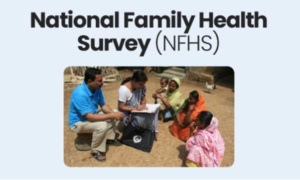National Family Health Survey-6: An Alarming Oversight.
Relevance
- GS Paper 1: Social empowerment, developmental issues.
- Tags: #NFHS #NFHS6 #disability #currentaffairs #upsc.
Why in the News?
- The Union Health Ministry, in response to criticism regarding the omission of disability-related questions in the 6th round of NFHS-6, defended its decision by stating that there is no necessity to gather such data every three years, given that the information is unlikely to undergo rapid changes.
- In a surprising move, the government decided to exclude disability-related questions from the sixth round of the National Family Health Survey (NFHS-6).
- According to Census data, 2.21 percent of the population are disabled in India.
Inadequate Understanding of Disability
- The concept of “disability” has evolved over the years, yet the government’s report on Persons with Disabilities in India fails to encompass the full spectrum of disabilities recognized under the Rights of Persons with Disabilities Act, 2016 (RPWDA).
- While this report acknowledges only eight disability categories, the RPWDA recognizes 21 categories, highlighting the need for a more inclusive perspective.
Neglecting Accommodation and Basic Rights
- The omission of disability-related questions seems to underscore a tendency to overlook the rights, needs, and perspectives of individuals with disabilities, particularly those with less visible or invisible disabilities.
- This oversight is further evident in the failure to account for adequate accommodations and rights, even in cases where disabilities are less apparent.
Invisible Disabilities and Oversight
- The 2021 Statistical Profile identifies nearly 24 lakh individuals affected by mental health-related issues.
- However, it fails to address invisible disabilities comprehensively. This becomes even more concerning when considering India’s high birth rate, as this omission contradicts the annual screening mandate for all children under Section 25(2)(c) of the RPWDA.
Limited Categories and Oversights
- While the report mentions categories like “mental retardation,” “mental illness,” and “any other,” the definitions remain unclear, differing from legislatively recognized categories such as “mental illness” and “intellectual disability.”
- This highlights an ongoing trend of oversimplification of disability-related matters.
Importance of Data Collection
- Regular data collection holds significant importance not only for meeting Sustainable Development Goals (SDGs) but also for complying with the United Nations Convention on the Rights of Persons with Disabilities.
- Given the extensive coverage and sample size of NFHS-6, this survey presented a prime opportunity to sensitize various stakeholders and promote research for the betterment of individuals with disabilities.
Government’s justification
- The Ministry of Health and Family pointed out that disability-related inquiries were already included in the 76th round of the Sample Registration Survey (SRS), conducted from July to December 2018.
- They mentioned that any required details could be extracted from the raw data, which is publicly accessible.
- Additionally, the ministry stated that disability statistics are not subject to rapid change.
- A principal investigator for the survey also clarified that questions about disabilities didn’t yield accurate data.
Concerns and Future Considerations
- There are concerns that sidelining disability-related inquiries could diminish the importance of disability rights, even as the government pursues its ambitious goals outlined in ‘Strategy for New India @ 75’.
- The need for comprehensive data is recognized in this strategic plan, emphasizing the challenges posed by the lack of detailed information for drafting policies that cater to the needs of people with disabilities.
In Conflict with Principles
- The decision to exclude disability-related questions from its survey was deemed contradictory to the fundamental principle of “leave no one behind” as outlined in the Rights of Persons with Disabilities Act, 2016.
- India, being a signatory to both the Convention on the Rights of Persons with Disabilities (CRPD) and the SDGs, is obligated to prioritize the collection of statistical and research data by governments for the purpose of policy formulation and implementation.
In light of these issues, it is crucial for the government to reevaluate its decision and incorporate disability-related questions into surveys, thereby ensuring that the unique challenges, rights, and aspirations of individuals with disabilities are not overlooked during this era of progress and development.
| What is the National Family Health Survey (NFHS)?
· The National Family Health Survey (NFHS) is a comprehensive and extensive survey conducted across India in multiple rounds. · This survey covers a representative sample of households throughout the country. Its primary objective is to gather crucial information about various aspects related to health and family welfare. · The NFHS gathers essential data on topics such as fertility, infant and child mortality, family planning practices, maternal and child health, reproductive health, nutrition, anemia, utilization and quality of health services, as well as family planning services. Conducted by · All surveys have been conducted under the stewardship of the Ministry of Health and Family Welfare (MoHFW), Government of India. · MoHFW designated the International Institute for Population Sciences (IIPS), Mumbai, as the nodal agency for the surveys. · NFHS was funded by the United States Agency for International Development (USAID) with supplementary support from United Nations Children’s Fund (UNICEF). The survey serves several key purposes
Other details · The International Institute for Population Sciences (IIPS) located in Mumbai serves as the nodal agency responsible for coordinating and providing technical guidance for the NFHS. · Collaboration takes place between IIPS and various Field Organizations (FO) for the successful implementation of the survey. · The funding for different rounds of the NFHS comes from diverse sources, including USAID, DFID, the Bill and Melinda Gates Foundation, UNICEF, UNFPA, and the Ministry of Health and Family Welfare of the Government of India. |
Sources: https://newsofhindustan.com/making-it-count-nfhs-6/
https://communitymedicine4all.com/2021/11/26/nfhs-5-key-findings-at-a-glance/
https://www.publichealthchronicle.in/
Mains Question
Discuss “Examine the decision to omit disability-related questions from the National Family Health Survey (NFHS-6) and its repercussions on the recognition and consideration of disability rights in India. Propose strategies to rectify this oversight.” 250words.





